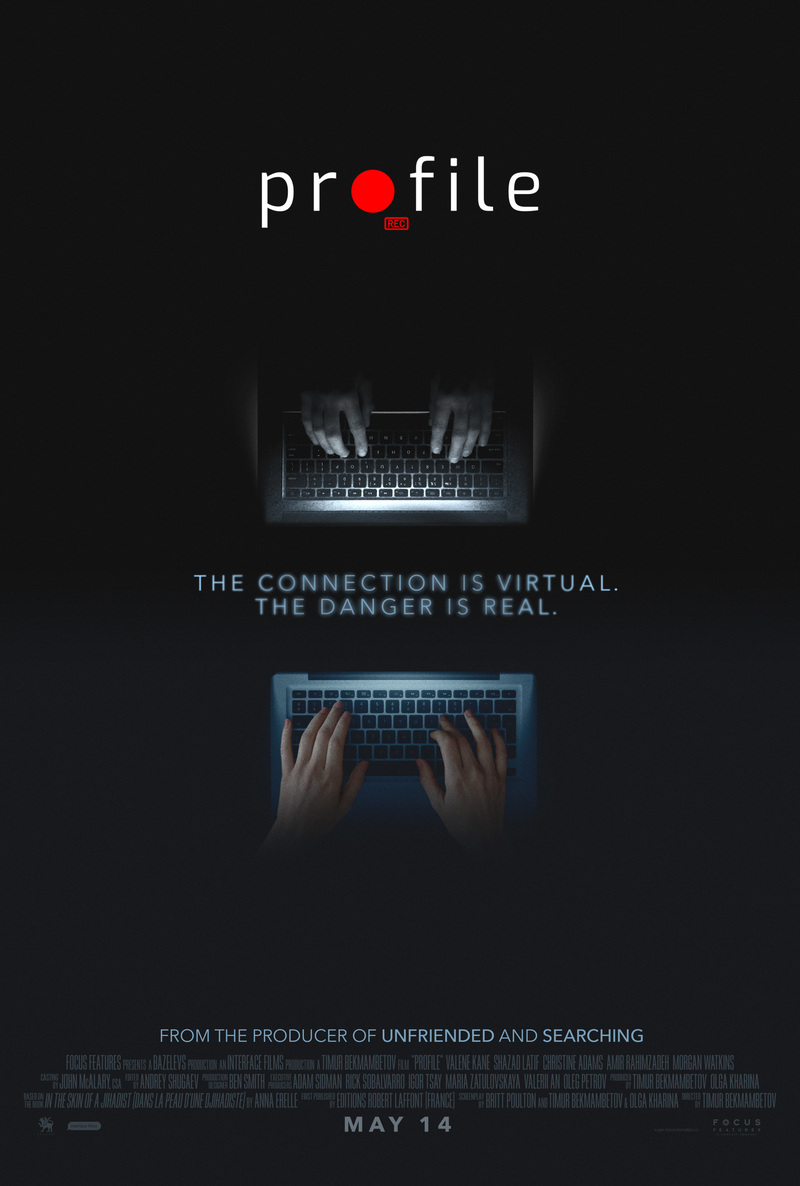
A freelance journalist investigates the online ISIS recruitment network
by creating a fake Facebook profile as a radicalised Muslim.
Review by
Musanna Ahmed
Directed by: Timur Bekmambetov
Starring: Valene Kane, Shazad Latif, Christine Adams, Morgan
Watkins, Amir Rahimzadeh

Director Timur Bekmambetov has firmly established that his career
now revolves around making films which take place entirely on a computer
screen. He’s dubbed this new subgenre the "cyber life" movie. This tool for
storytelling has primarily been used for thrillers with both
Unfriended
films,
Searching, and now Profile. He produced all those films but also directed Profile. Is the market for such movies already at risk of oversaturation? I can’t
say the answer is yes when the results are this exciting.
Profile may make the best use of the screen capture tool yet.
The conceit is that there’s a TV journalist based in Hackney, Amy Whittaker
(Valene Kane), who wants to do a story on how the so-called Islamic
State uses the web to mobilise women from Europe. After finding a few
Facebook profiles linked to the terror group, she intends to establish a
Skype connection with the suspected manager of the ISIS recruitment team.
That man is Abu Bilel al-Britani (Shazad Latif), a surname with a
handy anagram for his origins.

The correspondence between Amy and Bilel is really a clandestine cat and
mouse chase, where the cat and mouse are trying to seduce each other before
they strike. Amy wants to get close to Bilel, but what she really wants is
to coax him into revealing on camera the terror organisation's methods of
recruiting women. Bilel wants Amy to be his wife, but when you remember he's
a recruiter, you understand what his motivations are. Bilel is tough to
penetrate, so the assignment lasts far longer than Amy expects, almost
breaking herself under the pressure of a boss who wants to cut the story if
she doesn't meet her deadline and a significant other who's forced to pay
most of the rent following her delayed income. They live in London, so
naturally the financial situation greatly affects their relationship.
The characters are well drawn: there's a solid, if occasionally
distracting, personal drama about Amy's woes with relationships and work
running in parallel with the thriller that is her venture with Bilel. As for
him, sure, he's a humanised terrorist, acting all familiar when he sends cat
memes and talks about love, but there's a difference between making him feel
like a real person and making him sympathetic, the latter avoided by design
- the use of real ISIS videos and images (not the vulgar ones but still very
frightening) makes it impossible to have any sympathy for Bilel when he
speaks of how he was treated in Britain before he departed for Syria. Sadly,
it also says something about how young Muslims are radicalised when Western
society shows little sympathy for them in the first place.

The screenplay also engages with the concept of how fear and anger are the
tools used for recruitment by jihadists. Amy herself is somewhat fearful,
even going as far as to lash out at her editor for giving her a colleague -
whose job is to remotely record Amy's screen - of Syrian ethnic origins,
claiming they're all interlinked. Amy's prejudice towards Syrians is a
further insightful bit of social commentary, the message being how
individuals are quick to blame an entire group of people based on the
actions of a few.
When you have a solid screenplay with solid characters to boot, you need
top actors to play them and two rising stars, Kane and Latif, are given the
centre stage and do a sensationally good job. Latif brings charm and humour
into Bilel, which is appropriate only because it's the type of personality
that works for luring people into his trap. Kane's sincere performance
encompasses two characters, the real Amy and Melody Nelson, her hijabi
alter-ego.
While the two actors certainly have a respectable resume, it helps that
neither of them look like their most famous characters (Lyra Erso in
Rogue One
and Lieutenant Ash Tyler in Star Trek: Discovery respectively)
so the fact that they look markedly different to how we've previously seen
them adds a layer of authenticity, much like how
Paranormal Activity - which was a trailblazer for another
subgenre - worked because of its unknown actors. Not only that, it works
because they’re fully committed to realising their characters.

You'll be surprised at how often you'll laugh throughout
Profile. For every terrifying recording of ISIS, there's a well observed gag about
the mishaps that occur in how we interact online and about Amy's situation.
It barely undermines the tension, rather it adds further enjoyment to the
cinematic experience that wasn't found in Unfriended and
Searching. Overall, Profile is a cracking film that has a lot going
for it between the terrific performances, potent social commentary and an
ample amount of comedy.
Plus, this uniquely digital form of storytelling is perfect for a unique
narrative set across 3,000 miles and reflective of what happens in real
life, with pre-credits text reaffirming how unmonitored parts of the
internet are used for this twisted purpose. Like with Searching, Profile becomes a suffocating experience where the extended
intercourse between the central two characters gives us little hope for
Amy’s success. If there’s a consensus among all these cyber life thrillers
so far, it’s that they’re ideal for those who enjoy tight, claustrophobic
thrillers as the internet can be used to push people deep into a corner in
multiple ways. Bekmambetov is leading the charge of the cyber life thriller
and I'm here for all of it, until the possibilities run dry.

Profile is on Netflix UK/ROI
now.
